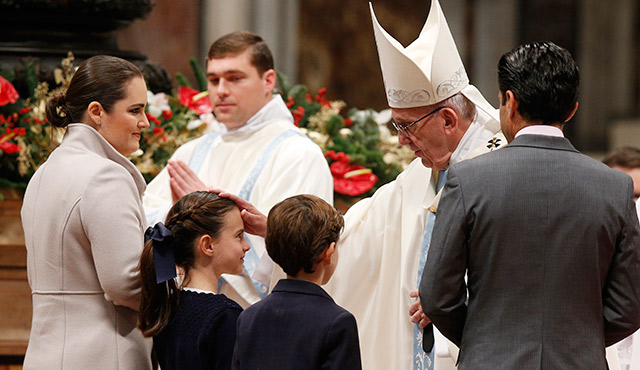Kids will be kids, which often means they will misbehave. And since children don’t come with individual instruction manuals, parents are on their own to discover the best ways to discipline their children. So, how should Catholics address the issue of discipline?
Katie Dawson, Director of Parish Faith Formation for the Diocese of Orange, says parents must be in charge at all times. “It’s a parent’s job to guide their children, to form them into adults. And sooner or later, no matter how sweet the child, discipline becomes necessary,” she says.
Maggie Vollebregt of San Clemente, a mother of nine children and a faithful Catholic, says families should set expectations and priorities and look to Jesus as their role model.
“We must verbalize expectations in order to get results, and ask ourselves ‘What would Jesus do?’” she says.
Vollebregt and her husband, Dave, have children ages 8 through 30. With such a broad range, discipline varies from child to child depending on their age and personality.
Finding what works for each child is key, Vollebregt says. “Time out worked for one child, writing sentences or perhaps a Bible verse worked for another,” she says. Other tactics Vollebregt has used include enforcing time away from friends and activities, restricting or taking away electronics such as TV and computer time, and even shutting off a phone if necessary.
“Laying out specific expectations is especially beneficial for teens because they tend to push the limits,” Vollebregt says. “Grades, dating and driving are motivators for encouraging good behavior and gaining privileges,” she adds.
Regardless of a child’s age, the home should be a place of respect, devoid of name-calling and belittling, Vollebregt says. “We try to limit sarcasm, but that’s more challenging because we do like to tease each other,” she says.
The Vollebregts make an effort to teach their children that family members should be treated as well as friends are—if not better. “We remind them that they will always have their brothers and sisters in their lives, but friends may come and go,” Vollebregt says.
Another important task is to teach children virtues. “Teaching our children the value of completing a task, working hard, considering the feelings of others, and honoring God is important to us,” Vollebregt says. Also important is creating an environment where children can learn about God and develop their faith. The Vollebregt home contains religious books, such as books about the lives of the saints, with the hope that perhaps “they’ll reach for one of those instead of the TV remote,” Vollebregt says.
Attending Mass and the Sacrament of reconciliation are other ways to bring families closer together. Reading devotionals, Bible stories and other Scripture together also is helpful. “There are so many stories in the Bible about failure and forgiveness that get the message across,” Vollebregt says.
Both Vollebregt and Dawson agree that teaching children to pray and praying together as a family can be a powerful way to unite families.
“Start each day fresh with a prayer that today will be the day Jesus wants it to be and that you and your children will do the right thing,” Dawson says.
“Praying together can be a powerful way to reach a child,” Vollebregt says. “When children hear you thanking God for the ways they are a blessing to you and identifying the things the family needs help with, it changes their hearts.”
This is a reprint of a column that previously appeared in Orange County Catholic in February 2014.

